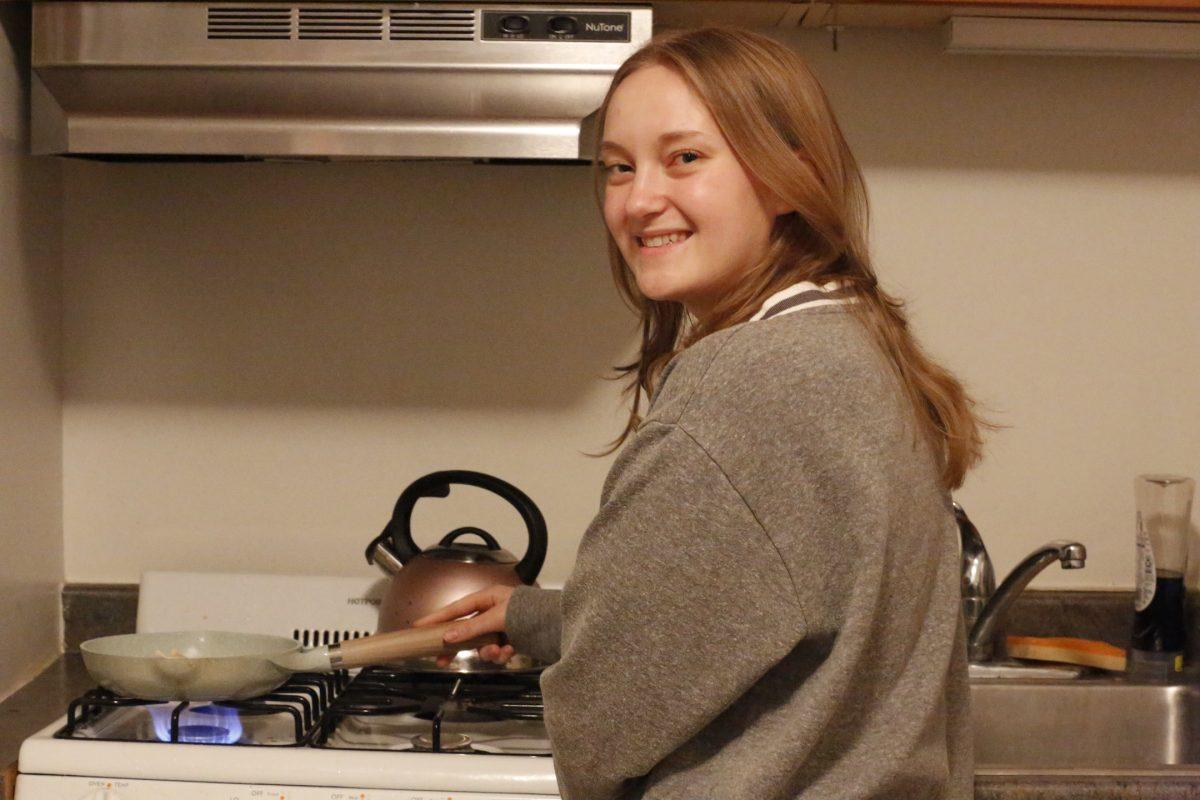I often find myself scrolling through the Grubhub app, despite having an entire cabinet stocked with food. As the essays and assignments start to pile up, the urge to give up on cooking and pick up Wendy’s grows.
Growing up in a household where takeout was more the rule than the exception, my relationship with cooking is a complicated one. While I enjoy it when I have the time, I tend to lean toward the easier, and often more unhealthy, alternative.
This habit of eating out, though very delicious, is expensive. So for one week, I set out to eat only home-cooked food.
Before I started this journey, I reached out to students who typically cook all or most of their own meals. Abby Dyhr ’25 can’t remember the last time she ate out or ordered food, but she does rely on some shortcuts.
“I think it is a little impossible to be able to cook for a long period of time every day without using either frozen vegetables or frozen meals, but I do think it’s possible,” Dyhr said.
Many college students don’t cook for a number of reasons, ranging from having no time, not having access to a kitchen or simply not knowing how.
“College students have very busy schedules, which may make it difficult to find time to cook themselves meals. They may also have limited transportation to access healthy and fresh food options,” said Sarah Fine, an Aramark nutritionist and dietitian at St. Joe’s.
On day one of this experiment, I went the easy way out, having a Pop-Tart for brunch and a bowl of pasta for dinner.
While on an average day I wouldn’t pay any attention to these meals, I couldn’t help but notice that neither of them were nutritional in any sense. Fine emphasized the importance of well-rounded, complete meals.
“It is especially important for college students to have complete meals to ensure that they are fueled properly to get through the day,” Fine said. “Students need energy for their studies, but also for any activities and sports they may participate in. A well-rounded diet can help keep students satisfied for longer periods of time.”
Noting this, I tried harder on day two, aiming for three balanced meals. Waking up an hour earlier than normal to account for breakfast, I sat down, half awake, and ate eggs and toast in silence. I followed this with a salami sandwich for lunch and chicken stir fry for dinner.
Dana White, a sports dietician and clinical professor of athletic training and sports medicine at Quinnipiac University, is also the author of the cookbook, “Healthy, Quick & Easy College Cookbook: 100 Simple, Budget-Friendly Recipes to Satisfy Your Campus Cravings.” In this book, she gives recipes for meals that are simple to make, especially for college students who may not have much cooking experience.
“You don’t have to be a professional chef, but if you can start assembling and putting together some of your meals, it can make a really big difference,” White said.
On day three or four, when the days had started to blend together, I broke. I walked into my kitchen around dinner time, and after staring blankly at my shelves, I started crying over just how much I didn’t want to cook after a long day of work and classes.
Ordering Chinese food felt like both a cheat and a relief.
On day five, I decided to get more creative when it came to my meals. After making a turkey burger from scratch with a side of frozen broccoli and potatoes, I felt like a bonafide chef. It took no longer than 20 minutes to put together, plus it was healthy, filling and tasted good.
Olivia Fisher ’26, who primarily cooks all her own meals, said cooking does not always have to be extravagant.
“I think a lot of people think cooking takes a lot longer than it actually does. It takes like 10 minutes to make pasta, and if you grill your chicken at the same time, that’s a whole meal,” Fisher said.
Days six and seven were a mix of waffles, leftover turkey burgers and pasta dishes. Since it was the weekend, I had more time to think about and plan what meals I would be making, along with ample time to actually cook.
By the end of the week, while I still had the urge to open my food delivery apps, I knew that I could make something equally as palatable at home. I even made plans to cook dinner with friends in the future, disrupting our usual routine of ordering food while hanging out. Fine encourages this behavior as one of many ways students can stick to a routine of home-cooked meals.
Making all of my own meals for a week was challenging, but not as difficult as I thought. While remembering to pack lunch when I was on campus or running back to my apartment to eat was tiresome at times, it was by no means the end of the world. I ate things that were not just pasta and takeout, and I saved a decent amount of my biweekly paycheck.
While I don’t see myself cutting out delivery entirely, I’m definitely going to eat in more often, if only for the sake of my wallet.

































